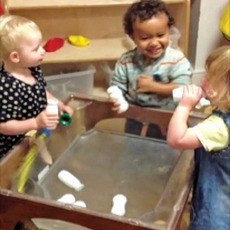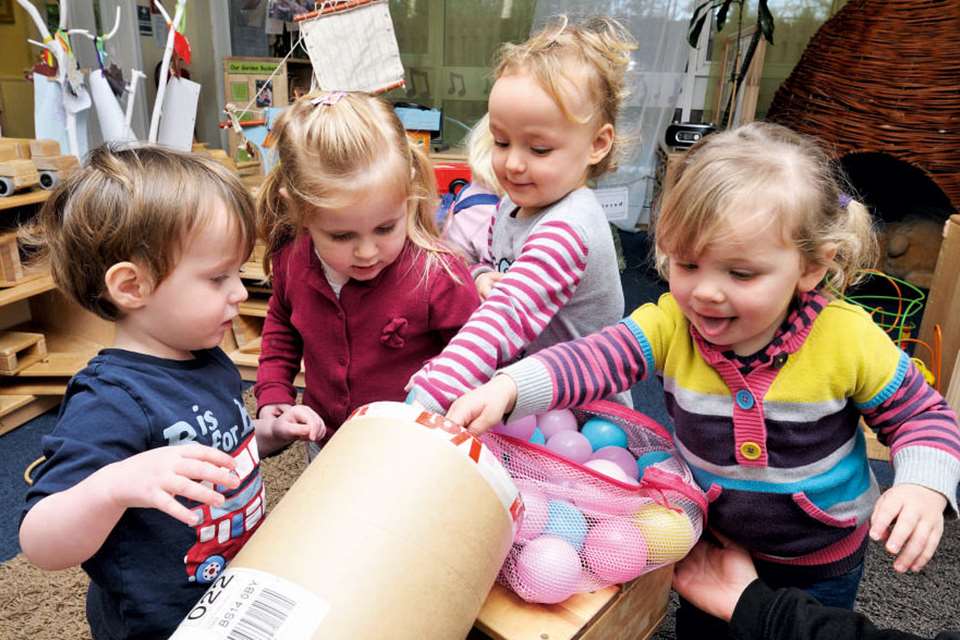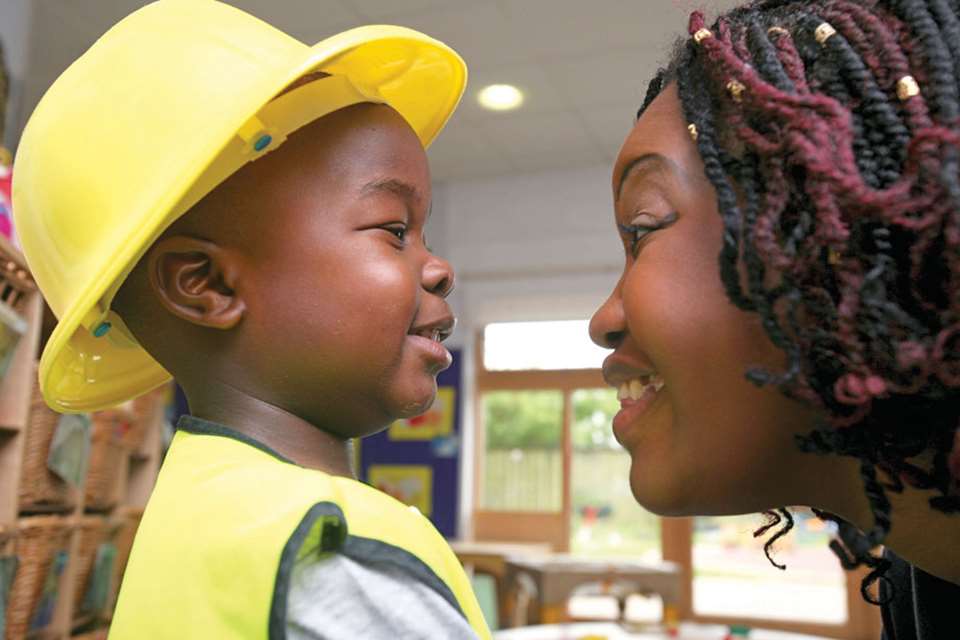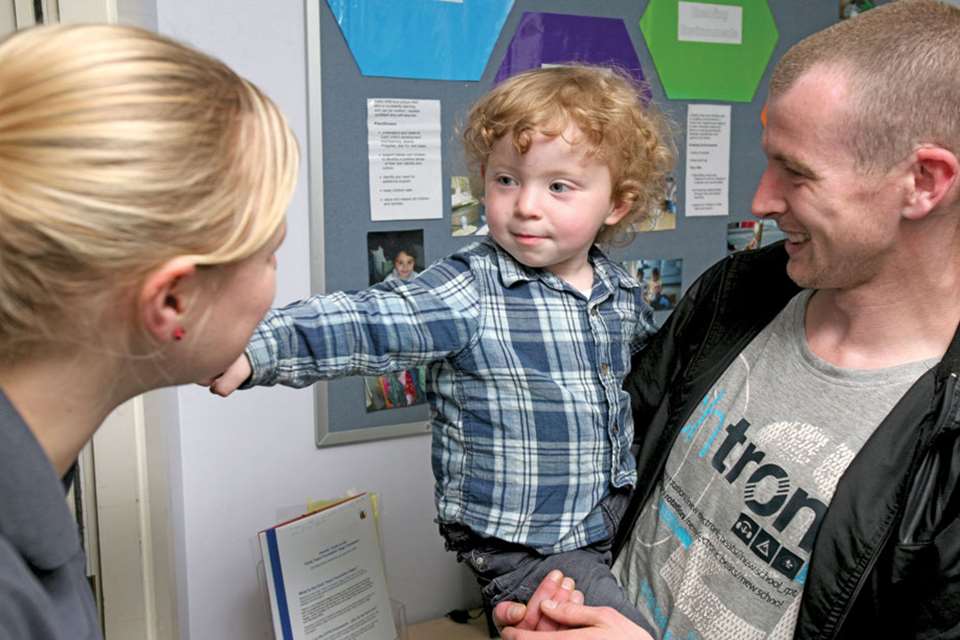Learning & Development: Two-year-olds - From within
Ruth Thomson
Monday, April 21, 2014
A network of settings is using reflective practice to raise the quality of experiences of two-year-olds. Kate Hayward and Andrea Layzell of Pen Green, co-ordinator of the Being Two project, explain.

Being Two is a Department for Education-funded project that aims to improve the quality of experiences for two-year-olds in early years settings and, particularly, to support better outcomes for the most disadvantaged children in this age group.
The project builds on the support by Pen Green Research, Development and Training Base and Leadership Centre of a thriving network of Early Years Teaching Centres (EYTC), which for the past three years have been sharing reflective practices with local settings with the aim of boosting quality of provision.
Under the Being Two initiative, Pen Green seconded associate trainers to nine different EYTCs for two years. These trainers, alongside co-workers in each location, are now busy training and supporting early years workers in private nurseries, pre-schools, children's centres, nursery schools and registered childminders working with two-year-olds and families accessing the free entitlement.
FIVE STRANDS
Being Two involves a whole-team approach and includes five strands.
The 'image of the child'
Each staff team negotiates their 'image of the child' through an exercise involving everyone's initial ideas on what it is that they want to promote in children in their setting. At Staghills Children's Centre, Rossendale, the 'image of the child' is for children 'to be resilient, curious, have positive relationships, communicative, confident, creative and imaginative' (see case study).
Key person approach
Staff teams reflect on their key person approach and how each child and their family are supported by a known and 'special' worker who is able to develop a relationship of trust and understanding with them.
Understanding vulnerability in your setting
Staff use five questions posed by Margaret Carr and colleagues in New Zealand (Carr, May, Podmore, 2002) to establish who they believe to be the most vulnerable children and families in their care: Do you know me? Do you hear me? Is this place fair for me? Can I trust you? Do you let me fly? Teams also discuss how their 'image of the child' relates to the more vulnerable children.
Peer observations using video
Staff use three-minute video clips of practice to reflect on pedagogy and how they support children to promote their 'image of the child'.
Working with parents - sharing knowledge and assessments
Each participant carries out a child study using video and works with a family to share knowledge about a child and how the child's learning is supported at home and in the setting. Staff and parents also share the frameworks of involvement and well-being (Laevers, 1997), schemas (Athey, 2007) and adult pedagogic strategies (Pen Green, 2005) used in the Pen Green Parents' Involvement in their Children's Learning approach.
Staff also share knowledge with parents to make a summative assessment three times a year of the child's development and learning, to look at the child's progress and to discuss the child's strengths and areas for development. The data is set out in a line graph for each child (through the Making Children's Learning Visible programme Pen Green software), which makes the child's learning and progress clearly visible.
Many practitioners supported through the initiative have welcomed its emphasis on reflection and improving practice from within the team. 'I now reflect and think what I could have done differently, what I could do next time ... I'm not frightened to say that perhaps I could have responded in a different way after reflecting on a question. I'm clear what I need to develop,' says Michaela Way, of Warwickshire consortium EYTC. Lisa Taylor, of Martenscroft EYTC, says, 'It has challenged my thinking and given me space to develop ideas.'
CHALLENGES
Being Two requires a particular way of working. It is not about an expert giving a diagnosis of areas for development and advice on practice improvement. This initiative is about staff teams developing through a project-based approach where they are challenged and supported to reflect on their ways of working.
Associate trainers initially found this approach tough. It requires a lot of hard work to build relationships with staff in settings and secure trust of the processes that the project work entails.
The training days on the project have been supported with cluster meetings and setting visits. Associate trainers have themselves had to develop their approaches.
Participating settings have also found some of the project work challenging. Getting to grips with the assessment data programme was initially daunting for some settings, but the graphs have freed practitioners to talk with families in a very positive way about children's progress and to link with health visitors about the Progress Check at Age Two.
Using video has also been an issue for some staff, but once the technology has been sourced, video work has created great enthusiasm for reflection on, and celebration of, learning.
PROGRESS
There have been some amazing outcomes within the first year. Each associate trainer has worked with a minimum of 11 settings in their locality and strong early years networks have been developed. Trainers are currently recruiting teams from a further 20 settings, and individual childminders, to the project.
We are developing the Pen Green website to enable all early years workers caring for two-year-olds to engage with the learning from the project and access quality exemplar materials on working with this age group.
'It's making the settings and the staff I'm working with realise how important it is to be open-minded, in tune with families and knowing each child well - beginning to link their learning together and taking on board what parents are sharing with us,' says Shabnam Amin of Martenscroft EYTC.
And speaking for many involved in the project, Bernie Stewart, a family support worker at Bram Longstaffe Children's Centre, says, 'The project has inspired me to be more confident in my work with two-year-olds. It has given me the confidence and ability to try out new ideas.'
CASE STUDY: STAGHILLS CHILDREN'S CENTRE, ROSSENDALE

By Rachel Lush, early years practitioner
'Image of the child' and understanding vulnerability
As a staff team, we came together to really think about the qualities we want to promote in children in our setting. A lot of discussion came from the suggestions of 'happy', 'healthy' and 'secure'.
Although everybody agreed that these were all things that we would definitely want for every child, challenge and discussion prompted further reflection. It was discussed that 'happy' was actually an emotion and that this would change with the child's moods. We also discussed 'secure' and 'healthy' being basic needs rather than 'qualities' that we would like to foster in children.
Key person approach
The key person approach is well embedded in our centre. Key workers carry out home visits to learn as much as they can about the child and the family and so make the child's transition into nursery as easy as possible.
We have been discussing and developing the 'image of the child' for some time and this has led us to reflect on our 'image of the child's key worker'. Again, we had lots of conversations and found that several key themes emerged. We are still working on this idea and plan to send out a leaflet to parents explaining and asking for input.
Peer observations
Another member of staff and I embarked on the peer observations. We recorded three videos of each other, with the intention of then picking the one that we felt most comfortable with. We felt this approach would relieve some of the pressure of being videoed and it did make both of us feel much more at ease with the whole process.
Working with parents
It has been really good to be able to share the assessment graphs with parents. The ensuing conversations have often led to the assessment being altered.
This year, we are beginning to do home visits for our funded two-year-olds so that the assessment can involve parents and carers. It is something we have always wanted to do for all families, but have been frustrated by lack of time and logistics.
One very interesting conversation that we had with a parent was about their child learning numbers. When the parent said that the child did not want to sit down to learn, I explained number was better learned through everyday experiences. This led on to a conversation about how everything can be learned through play. The parent found this immensely useful.
Our action plan
- To promote our 'image of the child' through our pedagogy.
- For our 'image of the child' to be central to us, linking with supervision, appraisal and peer observation.
- To continue to complete all assessments alongside parents.
- To continue to have regular meetings with all our staff in Hedgehog Club (a not-for-profit nursery fully integrated with the nursery school).
- To carry out peer observations and review the process.
- To revisit the notion of the 'vulnerable child' and have more in-depth conversations about this.
REFERENCES
- Athey C (2007) Extending Thought in Young Children: A Parent-Teacher Partnership, second edition
- Carr M, May H, Podmore V (2002) 'Learning and Teaching Stories: action research on evaluation in early childhood', European Early Childhood Education Research Journal, Vol 10, No. 2, pp115-125
- Laevers F (1997) A Process-Oriented Child Monitoring System for Young Children, Centre for Experiential Education, Leuven University
- Pen Green (2005) Effective Pedagogic Strategies
Kate Hayward is assistant director and Andrea Layzell is workforce development officer at Pen Green Research Base, Corby, http://childrenscentre.pengreen.org/research
MORE INFORMATION
Kate and Andrea will be talking about the Being Two project at our Two-Year-Olds: policy and practice conference in London on 9 July. The programme aims to bring delegates up to date on the funded places scheme and the progress check and offer guidance in delivering high-quality provision for this age group. For more information, visit www.two-year-olds-conference.com









